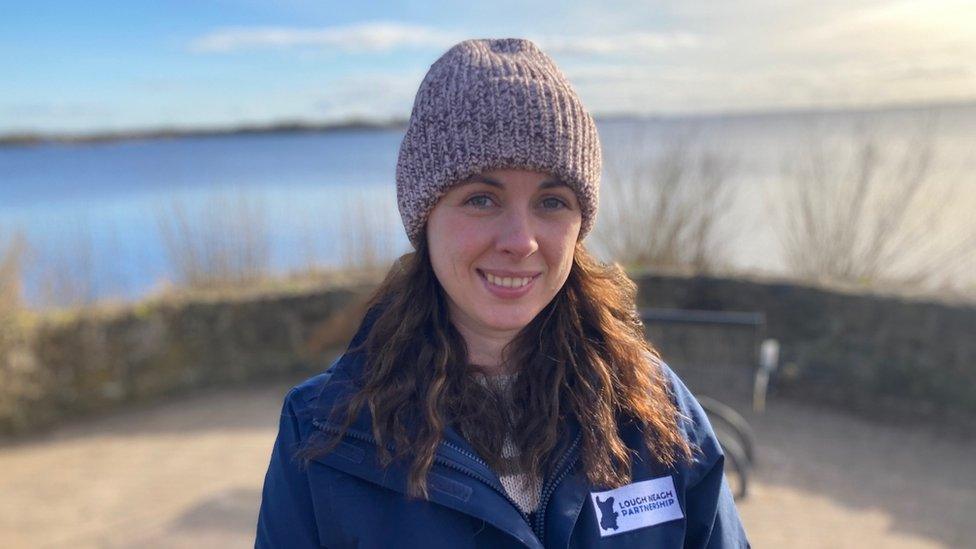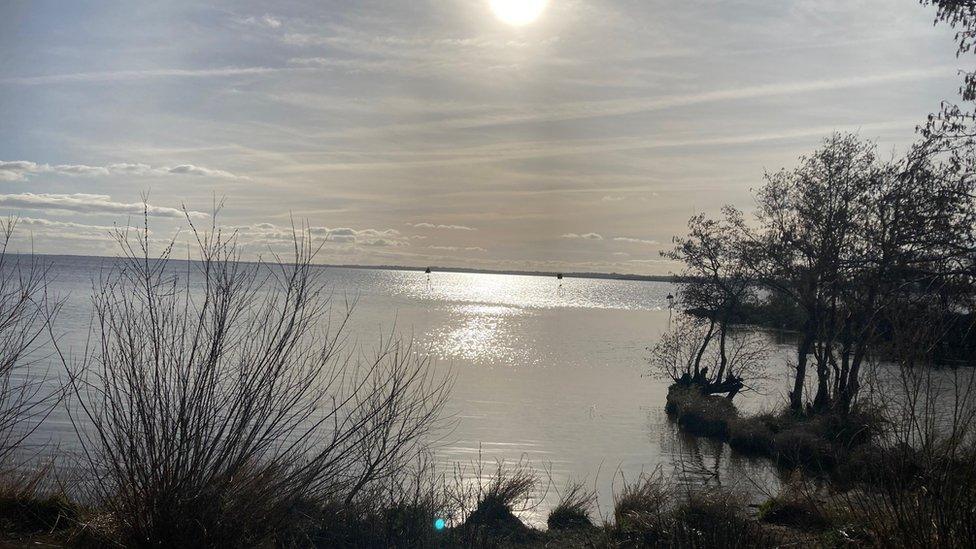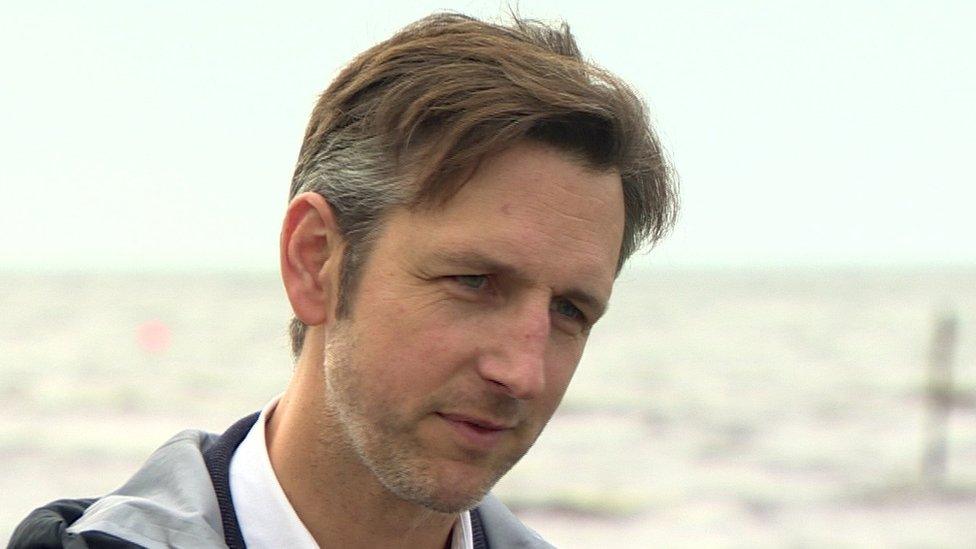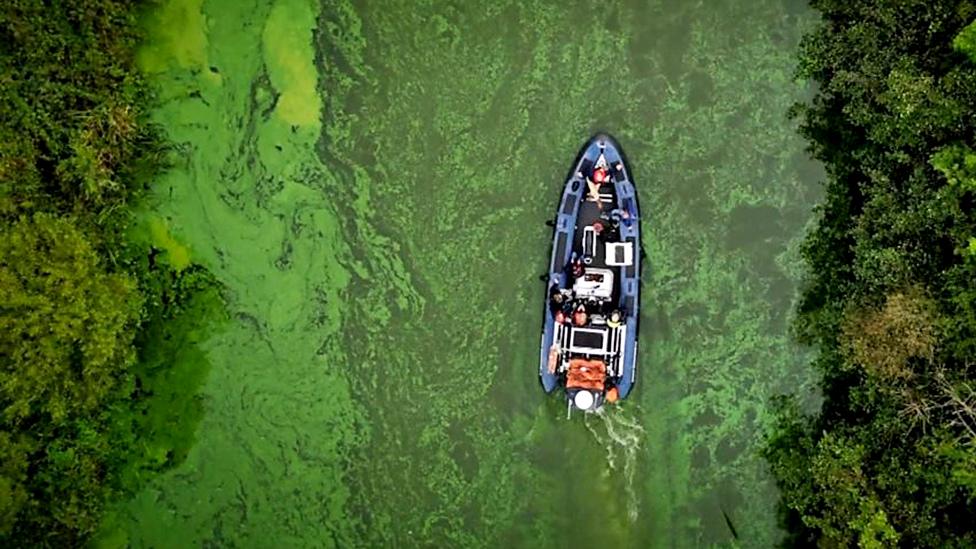Lough Neagh: Toxic algae potentially waking again
- Published
Gary McErlain said he hopes "some normality" will return to the lough.
Toxic blue-green algae in Lough Neagh has potentially begun to wake up again already, with two confirmed reports since the start of 2024.
Last summer, it brought the largest freshwater lake in these islands to the headlines.
The algae also brought misery to those who live and work around and on the lough.
As a seventh-generation fisherman on the lough, Gary McErlain felt the effects acutely.
The eels he catches every summer retreated to the lough bed beneath the suspended algae, out of reach of his nets.
That meant what was a main industry on the lough during the summer "sort of collapsed", he said.
And the thought of what could happen this year is playing on his mind.
"There was a time whenever my people my ancestors and others would have dipped their teapot into Lough Neagh and made their tea from it whenever they were out there fishing," he said.
"I'm not saying we're gonna get back to that anytime soon.
"But we need to get back to some sort of normality in Lough Neagh, because the whole infrastructure was broken last year."

Ciara Laverty says blue-algae levels tipped the scales
It is part of Ciara Laverty's job to monitor the numbers of wildlife at the lough.
She has been a ranger for the Lough Neagh Partnership for four years.
Blue-green algae did not stop her work, but it did have an impact on her.
"It was just a really depressing state of affairs to see it in that state," she said.
"Every year out on the lough, I had seen bits of algae but last year it really tipped the scales and at times, you got quite a stench from it as well.
"And I think it's a marker that the environment is changing - the ecology of Lough Neagh is changing."
The problems of the lough were mentioned on the opening day of the newly-returned Northern Ireland Assembly and it was one of the first visits on the new agriculture, environment and rural affairs minister's agenda.

Fish 'safe to eat' again
Private anglers on Lough Neagh can once again consume the fish they catch, after the Food Standards Agency (FSA) confirmed it was safe.
During the blue-green algae crisis of summer 2023, the FSA issued precautionary advice against consuming fish caught recreationally.
Its scientists wanted to be certain toxins produced by algal blooms did not accumulate in the flesh of the fish.
Fish from commercial fisheries were exempt from the warning.
Their facilities are subject to strict food processing guidelines.
The FSA's chief scientific adviser, Prof Robin May, said test results showed toxins did not accumulate in the parts of the fish that were eaten, meaning the fish were safe as long as they were properly handled and gutted.
"With this new information, we are now advising that recreational anglers can enjoy eating the fish they catch but they should take care when handling and gutting the fish to prevent contamination of the edible parts of the fish with toxins that may be present in internal organs," he said.
"Before cooking or freezing the fish, fillets should be rinsed with clean water to remove any contaminants from the gutting process.
"Advice remains that recreational fishing should not take place in areas of visible algal bloom and fish that are displaying abnormal behaviours, are dead or dying should not be eaten."

Fast action needed for 'precious' lough
Everyone agrees that there is no quick fix, but people like Martin Townsend believe the work must start now.
He was part of the UK Environment Agency team which examined how the River Thames was managed.
Now, as the director for the Centre of Excellence for Sustainability at the British Standards Institution, he and his staff have looked at the vulnerability of freshwater on a global scale. , external
He said a resource like Lough Neagh was precious and fast action was required.
"The longer you leave these conversations, the more urgent they become," he said.
"And actually that's when things become even more fragile.
"There are complications related to the lough in terms of land ownership, competing demands, those processes of change in discussions - you won't find a perfect solution overnight.

"So actually getting the right conversations at the right pace taking place, I think, is incredibly important.
"But the longer you leave it, the more challenging it will become."
The Department of Agriculture, Environment and Rural Affairs (Daera) formed a working group to examine the problems of the lough and to make preparations for the expected return of the algae.
It is due to report back shortly.
Speaking before the Daera committee this week, the department's minister, Andrew Muir, spoke of his "sense of shame" about what had happened in Lough Neagh.
"The problem which was bubbling below the surface came to the top," he said.
"But what was bubbling below the surface occurred over decades and it occurred because of environmental mismanagement."
And he said that if people genuinely and sincerely wanted to tackle the issues, a "really concerted effort" across government and society would be required.
'Jewel in the heart of Northern Ireland'
For Ciara, the silver lining to the blue-green algae crisis of 2023 is that Lough Neagh is finally getting the attention she believes it deserves.
"It is a jewel in the heart of Northern Ireland, it's got every environmental designation under the sun," she said.
"Everyone's still talking about the issues and it's very promising to see the new minister has made Lough Neagh a priority.
"So that fills me with hope."
Her optimism is shared - cautiously - by Gary.
"People take Lough Neagh for granted," he said.
"They love it, but they take it for granted.
"And I'm heartened to see the amount of people that have actually come out of the woodwork and are putting their face to it and their voice to it.
"Surely there's enough said and done and seen now to change policy on this. We need to get the job done."
Related topics
- Published22 February 2024

- Published2 January 2024
